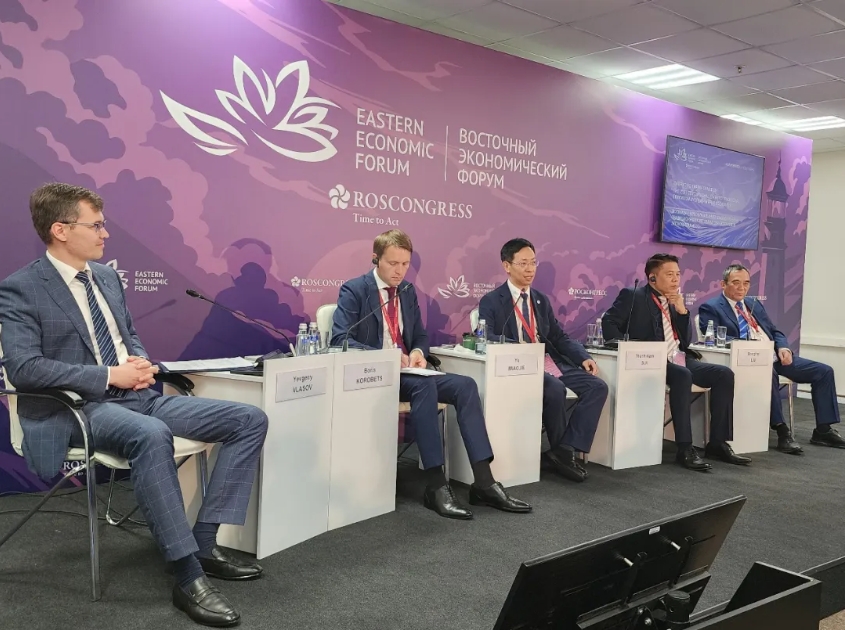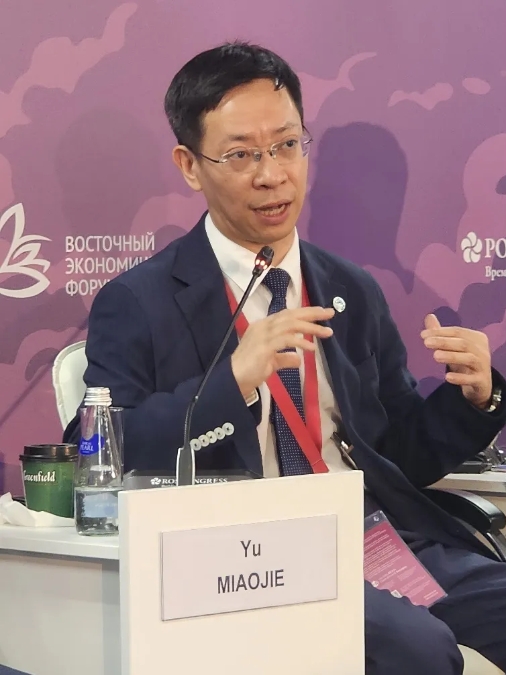From September 3 to 6, 2024, the 9th Eastern Economic Forum was held in Vladivostok, Russia. The forum, themed ‘Far East 2030: Combining Strengths to Create New Potential’, brought together over 6,000 officials, entrepreneurs, scholars, and experts from 76 countries and regions. The agenda included discussions on international cooperation in a changing world, issues related to the global economy and financial situation, and the development of Russia’s Far East and its role in the region.
Professor Yu Miaojie, a Deputy to the 14th National People’s Congress, fellow of the International Economics Association, Deputy Secretary of the CPC Committee and President of Liaoning University was invited to attend the 9th Eastern Economic Forum and visited Russian Far Eastern Federal University during the time. Associate Professor Yin Ruyu, Deputy Director of the Office of International Affairs, Professor Yin Hong from School of International Economics and International Relations and Assistant Professor Chen Feng from Li Anmin Institute of Economic Research also joined the visit and conducted academic exchanges.
On September 4, Yu Miaojie attended the sub-forum ‘Embracing Transformation: The 21st Century Challenge to Traditional Education Systems in APEC Economies’. Hosted by Yevgeny Vlasov, Vice President of International Relations of Far Eastern Federal University , the forum attracted speakers including Rebecca Sta Maria, Executive Director of APEC, Boris Korobetz, President of Far Eastern Federal University, Liu Ronghai, Chairman of the Board of Directors of Guangzhou Xinhua University and Pei Shengnan, Chairman of the Board of Directors of University of Social Sciences and Humanities under University of Hanoi.

Yu Miaojie made important comments on China’s economic development, scientific and technological innovation and education. He noted that firstly, China, like other countries, had recently faced challenges such as supply chain shocks and weak demand. However, China has successfully entered a new stage of high-quality economic development. This transformation is reflected in many aspects, such as the sustained growth of value-added output, the improvement of total factor productivity, the formation of industrial clusters and the comprehensive coverage of the whole industrial chain. More importantly, the structural adjustment of the primary, secondary and tertiary industries indicates that China has achieved several key development goals.
Secondly, to continue to promote the high-quality economic development of China, he believed that efforts must be made on the five development concepts including innovation, coordination, green, opening up and sharing, in which new quality productive forces is the key. Increasing R&D investment and improving total factor productivity are the key means to achieve high-quality development. In 2022, China’s R&D intensity reached 2.64%, which was very close to the OECD’s average of 2.66%. Innovation cannot be achieved without the support of higher education. In particular, universities and colleges play an important role in cultivating innovative talents and promoting scientific and technological progress.
Thirdly, different industries adopt different innovation strategies to achieve industrial upgrading. Traditional industries work to improve production efficiency through digitalization and low-carbon technologies. For raw materials industries, the key is to reduce the impact on the environment because these industries usually have high energy consumption and pose pollution risks. For strategic industries in the future, such as artificial intelligence, information technology, new materials, aerospace technology, advanced mechanical equipment and life science and technology, the introduction and development of cutting-edge technologies is essential. The innovation and breakthrough of these industries are inseparable from the support of higher education.
Fourthly, higher education should play a more active role in promoting economic development. By taking Liaoning University as an example, he introduced the university’s practice of establishing urban research institutes by sending teachers and students to cities in Liaoning Province. Through on-the-spot investigation, they understood the needs and challenges of local industries and cooperated with enterprises to formulate corresponding scientific research plans and proposed practical solutions. This mode of scientific research cooperation not only closely integrated universities with economic development, but also ensured that scientific research results could effectively serve social and economic development.

Finally, he concluded that higher education plays an irreplaceable role in national economic development. He called for joint efforts from all walks of life to promote the sustainable development of higher education to build a better world.